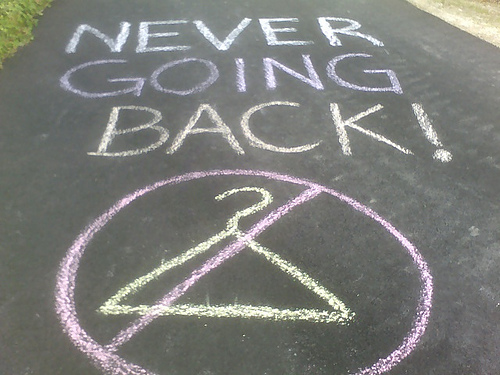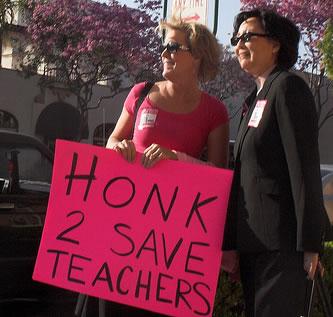by Hannah Gordon, Feminist Majority Foundation
 Welcome to the seventh #HERvotes blog carnival on the need to protect women and employment during these tough economic times, with a focus on the importance of extending Unemployment Insurance (UI) before the December 31st deadline.
Welcome to the seventh #HERvotes blog carnival on the need to protect women and employment during these tough economic times, with a focus on the importance of extending Unemployment Insurance (UI) before the December 31st deadline.
It is critical that Congress acts before the end of this calendar year to renew federal UI. The loss of this lifeline will hurt over 6 million people and their families who stand to lose their benefits during 2012.
If Congress fails to extend the benefits, women will suffer. According to Dr. Adriana Kugler, chief economist for the Department of Labor, 2.2 million women will lose their benefits if UI is not extended. Many others will be affected too, including 500,000 Latinos and 400,000 Latinas, 1.2 million African Americans (including 500,000 African American women), and millions of children.
UI must be extended in order to protect American families. 1.8 million struggling families will be immediately kept afloat. This will have a positive impact on our overall economy too; studies show that every $1 spent on unemployment insurance stimulates $2 in growth in the U.S. economy.
Extending unemployment insurance must be a vital priority for Congress. For many American families and many American women, the protection of their benefits is crucial.
Join us by sharing the posts below on Facebook, Twitter (using the hashtag #HERvotes), and other social media.
Let’s spread the word and make sure Congress hears our voices.
The blog posts below include personal stories and more information on why unemployment insurance is critical. Happy reading and thanks for joining in the fight to protect women’s economic welfare.
#HERvotes, a multi-organization campaign launched in August 2011, advocates women using our voices and votes to stop the attacks on the women’s movement’s major advances, many of which are at risk in the next election. We are very excited HERvotes is growing in membership and reaching millions of people.
Part of the #HERvotes blog carnival.
![]()
Congress Must Protect the Lifeline Women and Families Depend On– Vicki Shabo, National Partnership for Women and Families
A Day Of Thanks & Of Aspiration: No Child Should Be Hungry On Thanksgiving, Or On Any Day – Kristin Rowe-Finkbeiner, Mom’sRising.org
No Time for Games: Extend Unemployment Insurance– Katie Kopania, Say It Sister- NOW’s Blog for Equality
The Cycle of Abuse and Financial Security– Lauren Levine, Jewish Women International
Looking for Jobs that Don’t Exist Is Hard Work – Anna McClure, National Women’s Law Center
Latinas call on Congress to Extend Unemployment Insurance Set to Expire on Dec 31– Natalie D. Camastra, National Latina Institute for Reproductive Health
Extend Unemployment Insurance!– Heather Munro Prescott, Knitting Clio
At the Edge-Emily Alfano, National Council of Jewish Women
Women and Families Need Unemployment Benefits Extended Now!- Carol Rosenblatt, Coalition of Labor Union Women
I may lose my home because I can’t find work– Juli from Wisconsin, unemployedworkers.org
I Want My Pay Equity– Emmily Bristol, Sin City Siren
Women and Unemployment– Dren
Women, Black Workers Hard Hit By Attacks on Public Employees– Tula Connell, AFL-CIO
Even in a Recession, Flex Makes (Dollars and) Sense– Nanette Fondas, MomsRising.org
Unemployment Insurance in the 1930s and Today– Michael J. Wilson
And Now, About Those Mega-Rich Alleged Job Creators…– Lily Eskelsen, National Education Association
Congress Should Act Now to Extend Unemployment Insurance– Beth Scott, American Association of University Women
The 99% and Our Homes– Nancy Wilberg-Ricks, National Council of La Raza
Small Steps Forward in Job Gains, But Not Enough to Close Gender Gap– Caroline Hopper, Institute for Women’s Policy Research
Unemployment and Taxes– Andrew Brusnahan, UnemployedWoman.com
Unemployed Blogger Finds Humor In Rich/Poor Divide– Claire Gordon, AOL.com
I Am ‘Occupying’ D.C. for My Children and Future Generations– Linda Evans
When My Husband Faced Unemployment– Karoline, Mom’s Rising
Unemployment Insurance is the LEAST We Can Offer Working Families- Elisanta “Lisa” Batista
Without Unemployment Insurance, My Family Would Have To Choose Which Bills to Pay– Teresa “Tigger” Rey, Mom’s Rising
Good Education. Good experience. Still Unemployed– Theresa Witt
Holiday Fear– Christy Jones, AAUW
Unemployment, Congress, and People Like Me– Danielle Jackson, National Women’s Law Center
The Pathways Back to Work Act: A Must-Pass Piece of Legislation for Women– Julie Vogtman, National Women’s Law Center
Happy Holidays, Congress! It’s Time to Extend UI– Julie Vogtman, National Women’s Law Center
“No Christmas for Congress” Unless UI is Extended– Anna McClure, National Women’s Law Center
November’s Drop in Unemployment News Leaves Vulnerable Groups Behind- Abby Lane, National Women’s Law Center
Action Alert: Tell Congress to Extend Unemployment Insurance- YWCA USA
Navigating Unemployment– Jen, Mom’s Rising
Women, the Economy, and Unemployment Insurance– Angel Savoy, Metro DC Chapter, Coalition of Labor Union Women
Unemployment Insurance, Good For People, Good For Country– Sherry Saudners, Business and Professional Women’s Foundation
Women and the Unemployment Crisis– National Association of Social Workers
Surviving a Corporate War on the Middle Class– Verlene Jones, Seattle Washington, Coalition of Labor Union Women
Extend Unemployment Benefits, But Don’t Stop There- Lindsay Beyerstein, Ms. Magazine Blog
Tough Job Market for Recent College Grads– Corrina Beall, Feminist Majority Foundation
Women, Sexism, Racism & the Economy: Why Congress Needs to Reauthorize Unemployment Insurance- The Opinioness of the World







